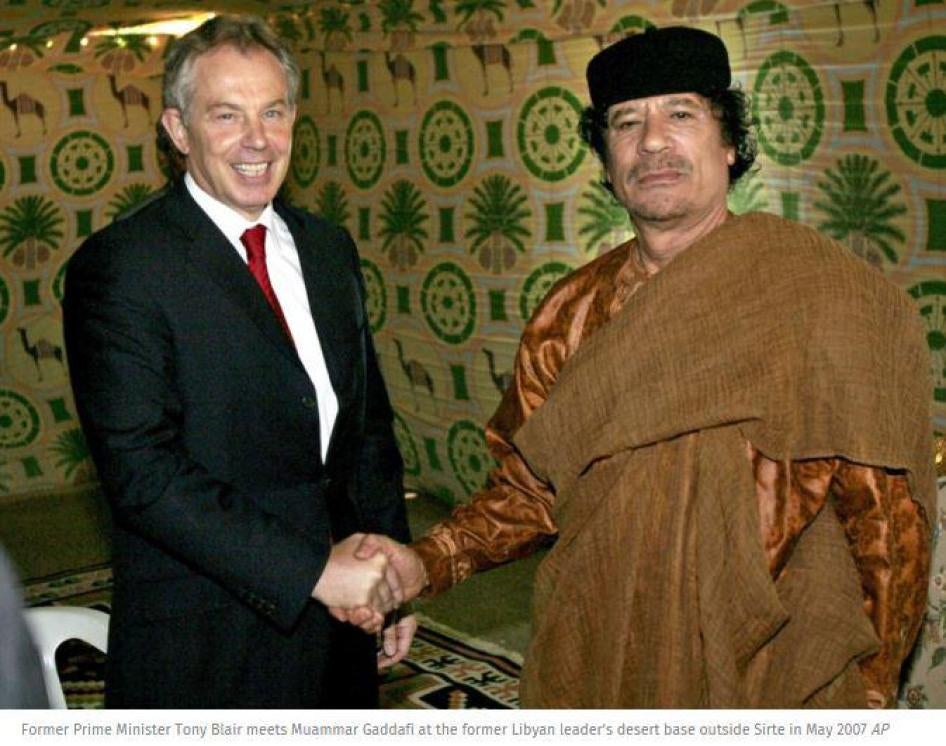The United Kingdom government’s decision to intervene militarily in Libya in 2011, to help topple then-leader Muammar Gaddafi, and its role there in the period since is under scrutiny from parliament’s Foreign Affairs Committee.
Former UK Prime Minister Tony Blair, who left office in 2007, is due to give evidence to the committee today. While he’d no doubt prefer to be questioned exclusively on the foreign policy of his successors, he should be asked why, from 2001 onwards, Gaddafi and his government, despite their appalling human rights record, were actively courted and then supported by Blair’s government, especially in the area of counterterrorism.
This is relevant because the events of 2011 cannot be separated from what came before. The violence and chaos of post-Gaddafi Libya is inextricably linked to the brutality and violations of the Gaddafi years, as well as the hollowing out of state institutions and the repression of civil society that took place under his leadership.
The most unconscionable aspect of this cooperation between Blair’s and Gaddafi’s governments involved extraordinary rendition, the unlawful practice of kidnapping Libyan opposition figures and returning them to Libya – predictably to torture – in exchange for Libyan intelligence on other global terrorist suspects. Evidence also suggests that the UK provided intelligence to Gaddafi’s regime on Libyan opposition figures living in the UK.
Thanks to a cache of unclassified documents discovered by Human Rights Watch researchers in Libya after Gaddafi was ousted, we know that Libyan dissident Sami al-Saadi and his four children were forced onto a plane in Hong Kong, in a joint UK-United States-Libyan operation in 2004. Al-Saadi was handcuffed, a hood was placed over his head, and his legs were tied with wire. His wife and children were imprisoned for two months in Libya, and then released. However, Sami al-Saadi was held for six years and says he was repeatedly beaten and subjected to electric shocks. In a similar case, Libyan opposition figure Abdul Hakim Belhaj was rendered to Libya together with his pregnant wife, with the involvement of the UK. A 2004 fax from M16’s head of counterterrorism to the Libyan intelligence chief, Moussa Koussa, explicitly took credit for the UK’s involvement in the transfer. Like al-Saadi, Belhaj was imprisoned by the Libyan authorities and routinely tortured.
Tony Blair has never acknowledged his government’s responsibility for these horrible events and human rights violations, and members of the Foreign Affairs Committee should press him relentlessly on these issues. They should also support a fully independent inquiry to get to the truth of what happened during this murky period, and hold UK ministers and officials to account for all violations of domestic and international human rights law. We cannot properly understand the chaos of today’s Libya without reference to the Gaddafi period, nor can we fully analyze more recent UK policy towards Libya without understanding the abuses of the Blair years.
Correction: This comment originally stated that Libyan dissident Sami al-Saadi, his pregnant wife, and his four children were forced onto a plane in Hong Kong, in a joint UK-United States-Libyan operation in 2004, and were handcuffed, hooded and with their legs tied with wire. In fact, Sami al-Saadi was the only person who was handcuffed, hooded, and had his legs tied. In addition, it was Belhadj’s wife who was pregnant, not Sami al-Saadi’s. This comment has been updated to reflect these changes.









